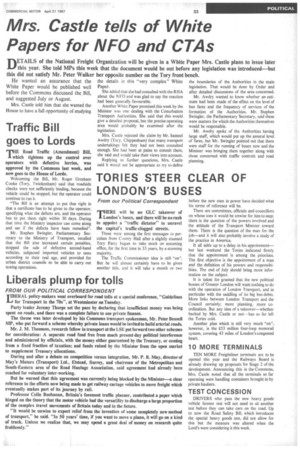Liberals plump for tolls
Page 35

If you've noticed an error in this article please click here to report it so we can fix it.
FROM OUR POLITICAL CORRESPONDENT LIBERAL policy-makers went overboard for road tolls at a special conference, "Guidelines for Transport in the 70s", at Westminster on Tuesday.
Party leader Jeremy Thorpe set the pace by declaring that insufficient money was being spent on roads, and there was a complete failure to use private finance.
The theme was later developed by his Commons transport spokesman, Mr. Peter Bessell MP, who put forward a scheme whereby private loans would be invited to build arterial roads.
Mr. J. M. Thomson, research fellow in transport at the LSE put forward two other schemes for consideration: A separate road fund free from much present-day political interference and administered by officials, with the money either guaranteed by the Treasury, or coming from a fixed fraction of taxation; and funds raised by the Minister from the open market to supplement Treasury allocations.
During and after a debate on competition versus integration, Mr. P. R. May, director of May's Motors (Transport) Ltd., Elstead, Surrey, and chairman of the Metropolitan and South-Eastern area of the Road Haulage Association, said agreement had already been reached for voluntary inter-working.
But he warned that this agreement was currently being blocked by the Minister—a clear reference to the efforts now being made to get railway cartage vehicles to move freight which eventually makes part of its journey by rail.
Professor Cohn Buchanan, Britain's foremost traffic planner, contributed a paper which hinged on the theory that the motor vehicle had the versatility to discharge a large proportion of the complex travel movements of Britain today and in the future.
"It would be unwise to expect relief from the invention of some completely new method of transport," he said. "In 50 years' time, if you want to move a piano, it will go on a kind of truck. Unless we realize that, we may spend a great deal of money on research quite fruitlessly."




































































































































